American Journal of Archaeology | The Journal of the Archaeological Institute of America
You are here
Cyprus from Basileis to Strategos: A Sacred-Landscapes Approach
January 2013 (117.1)
Cyprus from Basileis to Strategos: A Sacred-Landscapes Approach
Sanctuaries and religion were instrumental in forming the worldview of the ancient Cypriots, and one would expect that social power relations, meanings, and identities were expressed through the holistic concept of sacred landscapes. This contribution primarily discusses the change in the use and perception of sacred landscapes, which were originally constructed in the era of the Cypriot basileis (kings) but continued to function in a new political environment under the control of the Ptolemaic strategos (general). Furthermore, it proposes a contextualized methodology for approaching the study of sacred landscapes in Iron Age Cyprus, revealing new possibilities and their effects on our understanding of Cypriot social, cultural, and political histories and at the same time indicating the limits and the dangers of such a task. Drawing on ideas from theoretical/methodological studies of landscape archaeology and their relevant applications in other Mediterranean histories, this article explores how spatial order (i.e., the hierarchical arrangement of sites), as observed in sacred landscapes, is expected to articulate social order and to be linked with shifting relations of power and cultural influence in an ancient Cypriot context. It also suggests that a closer consideration of sacred landscapes and their complexities from a long-term perspective not only makes the transition from the Cypriot city-kingdoms to the Hellenistic period more comprehensible but also illuminates the political and sociocultural histories of both periods when they are studied in their own terms.
Cyprus from Basileis to Strategos: A Sacred-Landscapes Approach
By Giorgos Papantoniou
American Journal of Archaeology Vol. 117, No. 1 (January 2013), pp. 33–57
DOI: 10.3764/aja.117.1.0033
© 2013 Archaeological Institute of America


